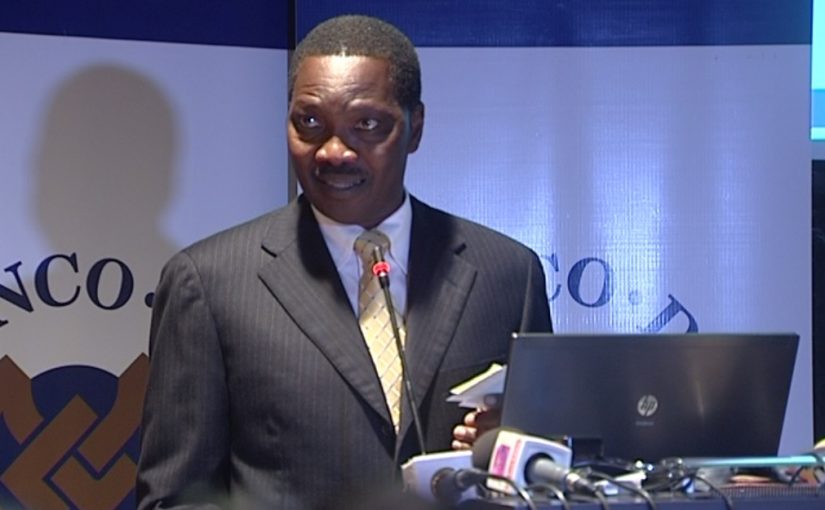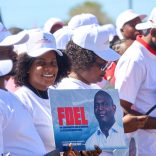China to offer zero-tariff access to 53 African countries including Mozambique
Watch: Central Bank defends its handling of Moza crisis – AIM

TVM / Rogério Zandamela, governor of Banco de Moçambique
The governor of the Bank of Mozambique, Rogerio Zandamela, on Monday vigorously defended the decision to put Kuhanha, the company that runs the central bank’s pension fund, in charge of the struggling commercial bank Moza, and denied that this breaches any ethical rules.
Moza Bank suffered a liquidity crisis in mid-2016 and was in danger of being unable to meet its obligations to its clients. The Bank of Mozambique stepped in, sacked its board of Directors, and installed a provisional board, under the chairmanship of one of the country’s most experienced bankers, Joao de Figueiredo.
When the existing shareholders, Mocambique Capitais (a grouping of about 400 Mozambican investors) and the Portuguese bank Novo Banco, proved unable or unwilling to capitalize the bank, an Evaluation Commission, set up by the central bank, received bids for Moza from other bodies interested in running the bank.
Last month, the decision was taken to put Moza into Kuhanha’s hands, and make it responsible for recapitalizing the bank. Under the new shareholding structure, Kuhanha holds 80 per cent of Moza. The existing shareholders retain the other 20 per cent – 10 per cent for Novo Banco and 10 per cent for Mocambique Capitais.
This led to an outcry in parts of the Mozambican press, with allegations that the deal constituted a conflict of interests. The country’s Central Ethics Commission, set up under the Law on Public Probity, even promised an investigation.
At a Maputo press conference on Monday, Zandamela said the cries of rage had surprised him. “I was expecting society to celebrate”, he said, since the decision had avoided the collapse of what had been the fourth largest bank in the country.
He said that Kuhanha had not put in a bid for Moza. Handing the bank over to Kuhanha had been “Plan B”, when more orthodox options did not come to fruition
The central bank rejected some of the bids for Moza because the bidders only wanted to buy bits of the bank, but the deal agreed with the shareholders was to keep the bank going as a whole. Furthermore, Mozambican law does not envisaged selling off parts of a bank.
Other bidders (and Zandamela did not say who they were) were suspected of intending to acquire Moza for money laundering purposes.
“People came who had the money”, he said. “But they were investors of a doubtful kind, who could not say where the money came from. That’s why we demanded a bank guarantee. We wanted to be sure that Moza Bank would not be used to launder money, and I’m not going to lie, there were indeed investors who came with those intentions”.
With no bidder making a proposal that satisfied that conditions laid down by the shareholders and by the central bank, the decision was taken to fall back on the contingency plan of using Kuhanha.
Zandamela pointed out that the Kuhanha takeover was welcomed by all those most closely involved in the matter – namely both existing shareholders (Mozambique Capitais and Novo Banco), and the banking regulatory authorities in Mozambique and in Portugal. He did not see why anybody else should make a fuss about it.
Zandamela insisted that the procedures followed had been entirely transparent and challenged anyone who doubted this to speak to other banks about what had happened.
“I don’t know any other process that has been as transparent”, the governor said. “I challenge anyone here or outside the country to bring me evidence of illegality. Everything was done so that the whole process could be an example and a pride for the country”.
As for the allegation that it was “unethical” to appoint Joao Figueiredo as chairperson of the board of the new Moza, just because he had been chairperson of the provisional board, and held ten per cent of the shares in a second bank, Unico, Zandamela said the central bank had been looking for the best professional available to sort out the crisis at Moza.
Figueiredo “didn’t come here looking for a job”, said Zandamela. “We went after him. I insisted that he take the post”.
As for his holding in Unico, Zandamela regarded that as irrelevant since Figueiredo held no position in Unico and was not involved in its management.
The new Moza must be restored to health within three years, said Zandamela. By then he expected Moza to meet all liquidity requirements and to be running at a profit.












Leave a Reply
Be the First to Comment!
You must be logged in to post a comment.
You must be logged in to post a comment.